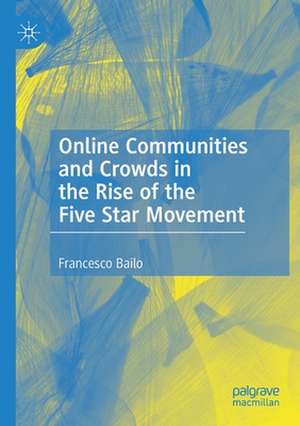Online Communities and Crowds in the Rise of the Five Star Movement
Autor Francesco Bailoen Limba Engleză Paperback – 8 aug 2021
| Toate formatele și edițiile | Preț | Express |
|---|---|---|
| Paperback (1) | 385.47 lei 43-57 zile | |
| Springer International Publishing – 8 aug 2021 | 385.47 lei 43-57 zile | |
| Hardback (1) | 391.79 lei 43-57 zile | |
| Springer International Publishing – 7 aug 2020 | 391.79 lei 43-57 zile |
Preț: 385.47 lei
Nou
Puncte Express: 578
Preț estimativ în valută:
73.78€ • 80.17$ • 62.02£
73.78€ • 80.17$ • 62.02£
Carte tipărită la comandă
Livrare economică 21 aprilie-05 mai
Preluare comenzi: 021 569.72.76
Specificații
ISBN-13: 9783030455101
ISBN-10: 3030455106
Pagini: 249
Ilustrații: XV, 249 p. 37 illus.
Dimensiuni: 148 x 210 mm
Greutate: 0.35 kg
Ediția:1st ed. 2020
Editura: Springer International Publishing
Colecția Palgrave Macmillan
Locul publicării:Cham, Switzerland
ISBN-10: 3030455106
Pagini: 249
Ilustrații: XV, 249 p. 37 illus.
Dimensiuni: 148 x 210 mm
Greutate: 0.35 kg
Ediția:1st ed. 2020
Editura: Springer International Publishing
Colecția Palgrave Macmillan
Locul publicării:Cham, Switzerland
Cuprins
1. Introduction.- 2. The Emergence of the Citizen User.- 3. Mobilisation and elections.- 4. Online communities and online crowds.- 5. Online discussion within the M5S community.- 6. The M5S community and citizen's income.- 7. By the crowd, for the people?.
Notă biografică
Francesco Bailo is Lecturer of Digital and Social Media at the University of Technology Sydney, Australia. His research focuses on the use of digital and social media in politics. He obtained his PhD in 2017 at the University of Sydney, Australia.
Textul de pe ultima copertă
This book reflects on the political capacity of citizen users to impact politics, explaining the danger in assuming that mass online participation has unconditionally democratising effects. Focusing on the case of Italy's Five Star Movement, the book argues that Internet participation is naturally unequal and, without normative and strong design efforts, Internet platforms can generate noisy, undemocratic crowds instead of self-reflexive, norm-bounded communities. The depiction of a democratising Internet can be easily exploited by those who manage these platforms to sell crowds as deliberating publics. As the Internet, almost everywhere, turns into the primary medium for political engagement, it also becomes the symbol of what is wrong with politics. Internet users experience unprecedented, instantaneous and personalised access to information and communication and, by comparison, they feel a much stronger level of irrelevance in the existing political system.
Caracteristici
Explains the complex relationship between an intensive use of Internet services and feelings of political disempowerment Presents an in-depth case study of Italy’s Five Star Movement Questions the assumption that the Internet is a source of unconditional democratising power
